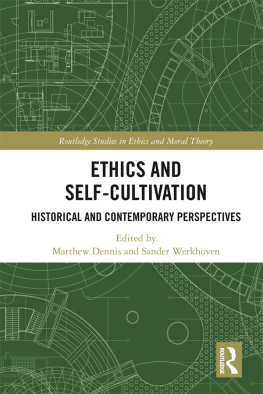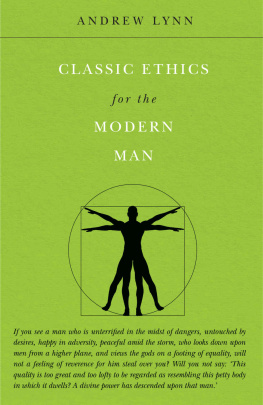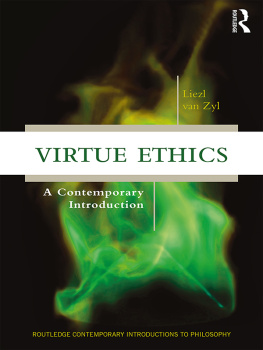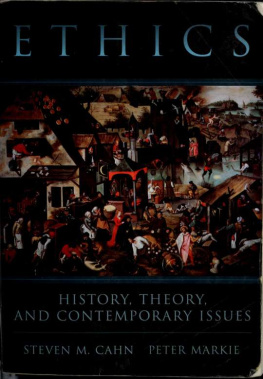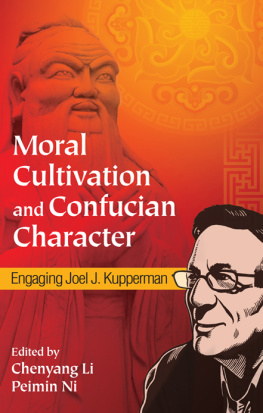Ethics and Self-Cultivation
This book makes an important contribution to the growing body of literature on the cultivation of virtue. It focuses on the influence of Hellenistic tradition, with its emphasis on the continued development of the self, on modern philosophy, and also includes a number of contemporary perspectives on moral self-cultivation. The volume will be of interest to scholars and graduate students in moral philosophy, moral psychology, philosophy of mind and epistemology.
Liezl van Zyl, University of Waikato, New Zealand
The aim of Ethics and Self-Cultivation is to establish and explore a new cultivation of the self strand within contemporary moral philosophy. Although the revival of virtue ethics has helped reintroduce the eudaimonic tradition into mainstream philosophical debates, it has by and large been a revival of Aristotelian ethics combined with a modern preoccupation with standards for the moral rightness of actions. The essays comprising this volume offer a fresh approach to the eudaimonic tradition: instead of conditions for rightness of actions, they focus on conceptions of human life that are best for the one living it. The first section looks at the Hellenistic schools and the way they influenced modern thinkers like Spinoza, Kant, Nietzsche, Hadot, and Foucault in their thinking about self-cultivation. The second section offers contemporary perspectives on ethical self-cultivation by drawing on work in moral psychology, epistemology of self-knowledge, philosophy of mind, and meta-ethics.
Matthew Dennis is a doctoral researcher on the joint-PhD programme of the universities of Warwick (UK) and Monash (Australia), specialising in philosophical accounts of character-development and self-cultivation. His current work draws on French and German philosophy, exploring how these traditions have the resources to contribute to debates in Anglophone ethics. He has published on Nietzsche, Kant, and virtue theory, and is currently writing on the philosophy of technology.
Sander Werkhoven is an Assistant Professor of Ethics at the Department of Philosophy at Utrecht University and a member of the Ethics Institute. His main research areas are the philosophy of medicine and psychiatry, normative ethics, and meta-ethics. He has published on theories of health and well-being in international journals, and has papers forthcoming on Nietzsche and Canguilhem.
Routledge Studies in Ethics and Moral Theory
Virtues Reasons
New Essays on Virtue, Character, and Reasons
Edited by Noell Birondo and S. Stewart Braun
In Defense of Moral Luck
Why Luck Often Affects Praiseworthiness and Blameworthiness
Robert J. Hartman
Risk, Technology, and Moral Emotions
Sabine Roeser
Wittgensteins Moral Theory
Edited by Rashef Agam-Segal and Edmund Dain
Welfare, Meaning and Worth
Aaron Smuts
Moral Skepticism
New Essays
Edited by Diego E. Machuca
Explaining Right and Wrong
A New Moral Pluralism and Its Implication
Benjamin Sachs
Determined by Reasons
A Competence Account of Acting for a Normative Reason
Susanne Mantel
Ethics and Self-Cultivation
Historical and Contemporary Perspectives
Edited by Matthew Dennis and Sander Werkhoven
For a full list of titles in this series, please visit www.routledge.com
Ethics and Self-Cultivation
Historical and Contemporary Perspectives
Edited by Matthew Dennis and Sander Werkhoven

First published 2018
by Routledge
711 Third Avenue, New York, NY 10017
and by Routledge
2 Park Square, Milton Park, Abingdon, Oxon OX14 4RN
Routledge is an imprint of the Taylor & Francis Group, an informa business
2018 Taylor & Francis
The right of the editors to be identified as the authors of the editorial material, and of the authors for their individual chapters, has been asserted in accordance with sections 77 and 78 of the Copyright, Designs and Patents Act 1988.
All rights reserved. No part of this book may be reprinted or reproduced or utilised in any form or by any electronic, mechanical, or other means, now known or hereafter invented, including photocopying and recording, or in any information storage or retrieval system, without permission in writing from the publishers.
Trademark notice: Product or corporate names may be trademarks or registered trademarks, and are used only for identification and explanation without intent to infringe.
Library of Congress Cataloging-in-Publication Data
Names: Dennis, Matthew (Doctoral Researcher), editor.
Title: Ethics and self-cultivation : historical and contemporary perspectives / edited by Matthew Dennis and Sander Werkhoven.
Description: 1 [edition]. | New York : Routledge, 2018. | Series: Routledge studies in ethics and moral theory ; 45 | Includes bibliographical references and index.
Identifiers: LCCN 2017061296 | ISBN 9781138104372 (hardback : alk. paper)
Subjects: LCSH: Ethics. | Virtue. | PhilosophyHistory. | Self (Philosophy)
Classification: LCC BJ21 .E856 2018 | DDC 170dc23
LC record available at https://lccn.loc.gov/2017061296
ISBN: 978-1-138-10437-2 (hbk)
ISBN: 978-1-315-10226-9 (ebk)
Typeset in Sabon
by Apex CoVantage, LLC
Contents
MICHAEL SLOTE
Part I
Historical Perspectives
JOHN SELLARS
AURELIA ARMSTRONG
IRINA SCHUMSKI
KEITH ANSELL-PEARSON
MICHAEL URE
MATTHEW SHARPE
KATRINA MITCHESON
Part II
Contemporary Perspectives
DAWA OMETTO AND ANNEMARIE KALIS
EDWARD HARCOURT
LUKE BRUNNING
ANNA BERGQVIST
QUASSIM CASSAM WITH THE EDITORS
This volume is a very welcome addition to the literature of ethics. Much philosophical discussion of human development focuses on moral development and tends to assume that this is largely or substantially a matter of moral self-cultivation; but the editors of the present volume have deliberately chosen a wider focus. Self-cultivation can not only include trying to find a way toward a morally better or happier life for oneself, but can also be a matter of seeking to develop certain non-moral excellences in oneself, and the essays of this volume attest widely and fully to these enlarged possibilities.
Even if most of us ethicists are mainly interested in moral issues, we have to acknowledge that there are important ethical issues beyond the moral as well. But the very breadth and scope of this volume raises issues that could not be addressed in a single collection. Perhaps the most important such issue concerns a major difference between moral development and the development of non-moral excellences and of the capacity for a happy life. The desire for happiness comes more naturally to us than the desire to be morally good to others; it runs deeper and is less in need of cultivation than moral motives are. To be sure, and as Bishop Butler pointed out long ago, many of us thwart our own happiness in various ways, but for most of us the desire to lead a happy life is always there. So when we become convinced that certain practices or efforts will serve to make us happier, our motivation doesnt have to change in order for us to have some desire to implement those practices or efforts. Similarly, with certain excellences. According to much of the psychology literature, human beings are born with a strong desire for mastery or competence. This means that when an adult or adolescent learns of a way in which they can become more competent at some skill they already to some degree possess, there is an antecedent motive for making the relevant change.

